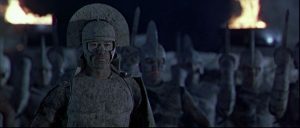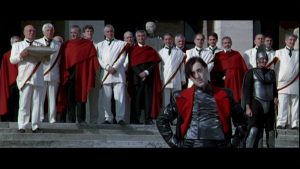Julie Taymor’s Titus (1999) is an interesting take on one of Shakespeare’s lesser filmed plays. Blending modern and ancient, Taymor creates a visual masterpiece that is complemented by the outstanding performance of Anthony Hopkins as Titus.
Taymor chooses to mostly stay true to Shakespeare’s text, but instead plays with it by changing the aesthetics of the play. The movie adopts an aesthetic that is representative of ancient Rome while modernizing it. My two favourite examples of this is the opening scene of the movie and the costumes of the characters.
The opening scene is comprised of a mixture of still shots and slow pan shots in the Colosseum of Rome as Titus and his army return from battle with the Goths. In this scene, the dominance of the Roman army under Titus is established. Taymor also uses this scene to blend the ancient setting of the play with the modern aesthetic she is looking for. The Roman army, appearing to resemble the Terracotta warriors, marches in a ritualistic way to celebrate their victory. The impressive machinery of the Romans is contrasted with motorcycles (also dressed up in a Terracotta style). In this opening scene, I feel Taymor is trying to impose the power of the Roman Empire upon the viewer. Placing ancient Roman ritual and modern technology in the same scene gives the feeling of a Rome that never died, and a Rome that will continue to be victorious.

Taymor also creates this effect because of the way she shoots the scene. As mentioned, Taymor uses a hybrid of still shots and slow pan shots, each with their benefits. The still shots allow the viewer to watch the massive army march in sync, allowing the army to intimidate the viewer. In the pan shots, we are able to see the size and strength of the army. Taymor usually pans in from above, turning the focus from narrow to wide. This gives the viewer an idea about the size and greatness of the army, once again reinforcing the greatness of Rome.
We are introduced to more of the modern imagery through the costumes of characters.

Saturninus, played by Alan Cumming, continues the mix of ancient and modern. In this particular image, we can see a combination of a Roman senator’s toga and the modern senator’s suit. This is the typical dress for characters, once again furthering the idea of a eternal Rome. Taymor’s visual choices keeps this interpretation of Titus Andronicus her own, allowing a modern audience to be grounded in the greatness of the Empire even though that may not necessarily be as familiar with the Roman era as someone in the Renaissance.
Perhaps the most interesting aspect of the film is the acting performance of Anthony Hopkins as the title character. I found Hopkins to be absolutely convincing in every scene he was in. In the early scenes of the movie, his performance was calm and collected while effectively portraying a powerful and dominating general of Rome. I was most impressed with Hopkins when Titus was following through with his revenge against Tamora and Lucius.
As the scene unfolds, Hopkins remains calm while also being breathtakingly terrifying. Perhaps due to his previous experience playing a maniacal murderer (The Silence of the Lambs), Hopkins delivers a performance that is both blood-chilling and effective. When he is delivering his monologue to Chiron and Demetrius, Hopkins is entertainingly cruel, almost downplaying the graphic violence present in this scene.
The later half of the above clip, the climax of the film, is my favourite moment of the entire film just because of Hopkins’ acting. When he is serving the pies containing Chiron and Demetrius to Tamora, Saturninus and company, Hopkins continues this facade of calmness above Titus’ impending revenge. After killing his own daughter Lavinia, Hopkins launches into a raving explanation of his revenge plot, revealing the disturbing details to Tamora before killing her. The dramatic buildup in the scene is fulfilling because of this monologue. Hopkins breaking from his stoic tone into a violent and enthusiastic one is satisfying, both for the character and the viewer. Despite the depravity of his actions, you can’t help but cheer for Titus when Hopkins delivers this speech.
Overall, Titus is a very interesting and captivating film from a visual perspective, but it is the acting of Anthony Hopkins that truly makes this movie an enjoyable adaptation of Shakespeare.
Leave a Reply
You must be logged in to post a comment.